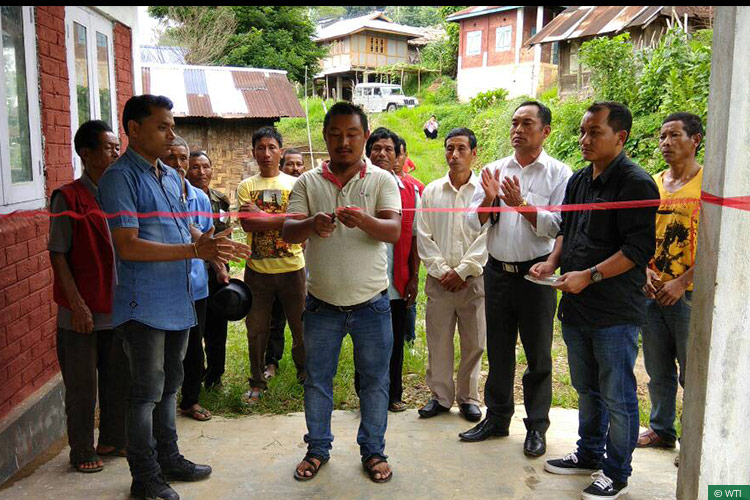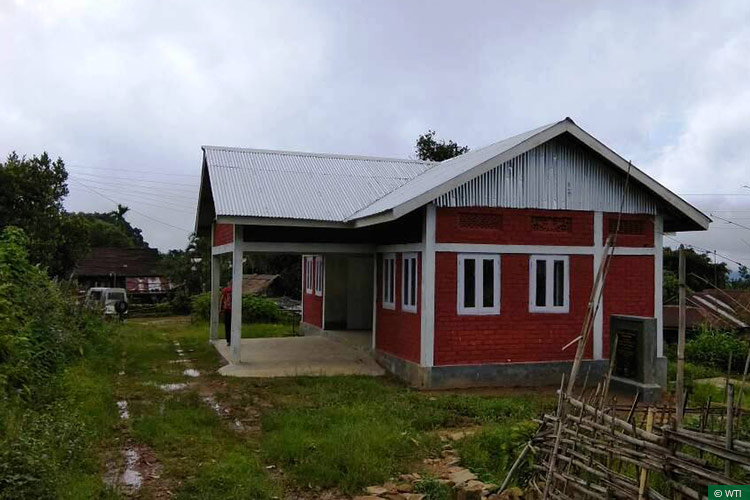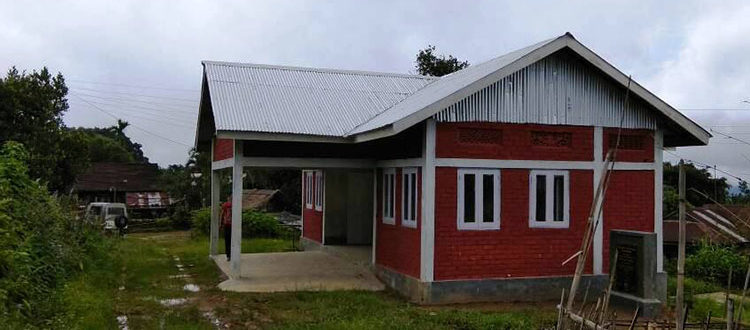Furthering the Cause of Amur Falcon Conservation, WTI Hands Over Newly Constructed Eco-tourism Guest House to Pangti Village Council
 The eco-tourism guest house being inaugurated by the chairman of the Pangti Village council
The eco-tourism guest house being inaugurated by the chairman of the Pangti Village council
Pangti, Nagaland, June 29, 2017: The Wokha district of Nagaland is ground zero when it comes to Amur falcons (Falco amurensis) in India. It is here, on their 15,000-mile migration from the Amur region of Russia, China and Mongolia all the way to southern Africa, that these sleek grey raptors make a pit stop in Indian territory. They descend in the hundreds of thousands, perhaps millions, to roost by the vast Doyang Hydroelectric Reservoir and its surrounding jhummed lands.
As recently as 2012, over a hundred thousand falcons were reportedly trapped and killed in the district, mainly by locals residing in the villages of Pangti, Asha and Sungro located on the fringes of the Doyang Reservoir. But that was then. A conservation partnership between Wildlife Trust of India (WTI), local Village Council Members (VCMs), the Amur Falcon Roosting Area Union (AFRAU), the Nagaland Forest Department and the Stop Poaching Fund engineered a remarkable change.
A number of Rapid Action Projects (RAPs) were initiated by WTI’s Wild Aid division, focused on improving the livelihoods of local communities and sensitising them towards the ecological and economic benefits of protecting Amur falcons. As a result, VCMs imposed stringent penalties against falcon hunting in the area and the local communities, long-time hunters of the migratory raptors, became their staunch protectors.
Now, as the Amur falcons swoop down to roost in Wokha every October, they find a far more hospitable environment. The Doyang Reservoir is one of the safest places in India for the raptors and has recently been nominated as a UNESCO World Heritage Site. With zero mortality due to hunting in the last three years, the Amur falcons, once destined for local cooking pots, are proclaimed the ‘Pride of Nagaland’. Pangti village, indeed, proudly declares itself the ‘Amur Falcon Capital’ of India!
With the villages near Amur falcon roosting sites lacking tourist infrastructure, WTI took up the mantle of constructing an eco-tourism guest house
Even so, in order to ensure the long-term conservation of Amur falcons, it was essential that the momentum established should not be allowed to flag. WTI went back to the concerned stakeholders – AFRAU and the VCMs of Asha, Pangti and Sungro – and set up a series of consultative meetings. Based on these discussions it was found that the Doyang reservoir and its fringe villages had begun to attract nature lovers from across the world (over 2000 tourists according to one estimate) during the Amur falcon migration season from October to November, and for the Hornbill Festival in December. However, though the potential for eco-tourism as an annual source of revenue for local communities was huge, the Amur falcon roosting sites were all found lacking in basic tourist infrastructure.
To address this lacuna, WTI took up the mantle of constructing a guest house that could be used as an eco-tourism resource in the area. The VCMs provided land for the construction in Pangti, which is a nodal village. The building’s blueprint was finalised in consultation with the VCMs and an attempt was made to incorporate elements of the local Lotha architecture in the design.
 The newly constructed guest house in Pangti village, Nagaland
The newly constructed guest house in Pangti village, Nagaland
On June 25, WTI Manager & Project Lead Mr Dilip Deori formally handed over the guest house keys to the Pangti VCM Chairman Mr Jenithung N Shitiri in the presence of gaon buras from all three villages. Mr Deori briefed the locals about the significance of the guest house and how it could benefit them. A foundation stone was also unveiled by Mr Shitiri and a prayer offered by Mr Mangleo Ngullie, Pastor of the Pangti Baptist Church. Officials of the Nagaland Forest Department were also present.
“On behalf of the Pangti people I would like to thank WTI for constructing this beautiful guest house”, said VCM Chairman Mr Jenithung N Shitiri on the occasion. “It will bring more visitors to Pangti and benefit people in the area in due course of time.”
“The people of Pangti have played a pivotal role in ensuring safe massage for the marathon migrants, the Amur falcons”, said Mrs Zuthunglo Ezung (IFS), Divisional Forest Officer, Wokha. “The guest house will cater to the needs of tourists who visit the village during the great migration season and I am glad that WTI has supported the local community in this way.”
In addition to housing visitors, the guest house will have prominently displayed collaterals providing vital information about the history of Doyang, Amur falcons, and the initiative taken by local communities to aid their conservation.









